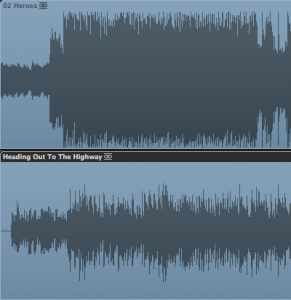Like a lot of you, I grew up listening to music constantly. Vinyl LPs and 8-tracks — really! — and cassettes, recording songs off the radio (the original downloading!), dubbing friends’ cassette tapes and LPs (the original file sharing!). And then CDs, of which I still own a few hundred. I learned to love music as it sounded through stereo speakers, loud when I could but generally not louder than the neighbors could handle.
My major sensibility for sound comes from what I was hooked on in my teens – first heavy pop with a progressive edge: Styx, Supertramp, ELP, and then increasingly heavy rock like AC/DC, Def Leppard, Motley Crue, then Black Sabbath, Dio and the mighty Judas Priest. Throw in some 80s synth pop and later some Seattle grunge and you can pretty much figure out where my sound comes from!
But this is also the time my ears were trained to hear music — before today’s hypercompressed music that is designed to sound loud all the time so you can hear it in your earbuds while jogging down a city street or working out in a noisy gym. “Everything louder than everything else.” Thankfully, right now there is a growing backlash to this type of ‘squashed’ sound (aka the “Volume Wars”), and as much as I like loud rock, I am very conscious of what is called dynamic range — the difference between the soft and the loud in a musical piece. So I’m taking extra care while remixing and remastering my catalog to make sure that 1) the music sounds good on both speakers and earbuds and 2) there is enough dynamic range that the music breathes and sounds the way I intended it (or as much as I’m capable of doing!)
Here’s an example of what music looks like now compared to what it looked like then: Shinedown – Heroes from 2005 vs Judas Priest – Heading out to the Highway from 1981. In 2012, releases have gotten even louder, with even less dynamic range.
Is it better-sounding or just louder? It’s a psychoacoustic fact that louder generally appears to sound ‘better’*, but it’s an equal fact that hypercompressed songs sound more fatiguing and not as sonically pleasing compared to their own less-compressed versions (remember the “Death Magnetic” backlash?). Somewhere in the middle is balance.
The idea gaining groundswell is to mix & master for dynamic range and do what we used to do, just turn it up if you want it louder! I’ve now dedicated many hours to learning how to make my songs sound as good as they can, and as loud as they can bear without sacrificing tonal quality. Lofty goal for an independent music maker but it’s something I feel strongly about. You can listen to the new versions of the songs on “Summer’s End” to see if you think I’m succeeding. In the process, I also discovered that I can really hear the difference between a 256-bit MP3 and a 128-bit MP3, and all current and future downloads will be no less than 256-bit. You simply lose too much quality when you go to 128-bit.
I don’t want to make it sound like I’m going to all this trouble just for the dynamic range, and certainly don’t want to discredit the great guys over at Last Drop Mastering who did a great job with what I gave them to work with. The truth is that I know so much now that I didn’t know when I was starting out and wanted to take the opportunity to give myself a do-over. I may have been more creative in some ways then, doing things in the mix I probably wouldn’t think to do now, but I have more of a handle on how to get things to sound the way I want them to than all those few years ago, and better tools to get me there.
With all that in mind, I’m remixing, remastering, and rereleasing my back catalog. First came the remixed remixes, released as “Big Tips”. Then came the remixed “Summer’s End” with its tantalizing cover restored. Next will be the reworked debut album “It’s Hard”, coming soon. Discover it or re-discover it on the music page. Take one down, pass it around. And follow on Twitter and Facebook for the latest news from Mojo’s Army!
Rock Rock Till You Drop!
Mojo
*Google Fletcher-Munson to figure out why.


